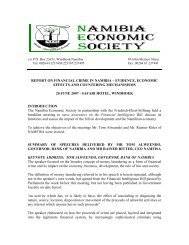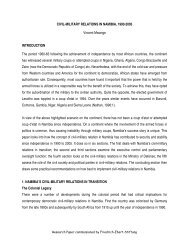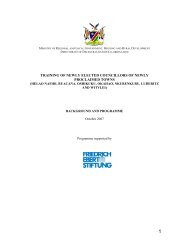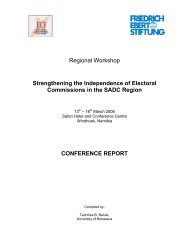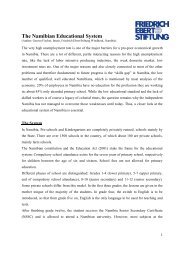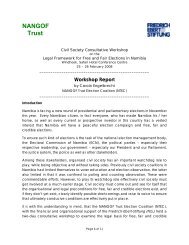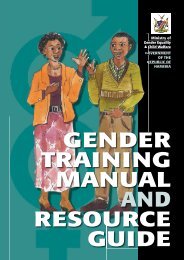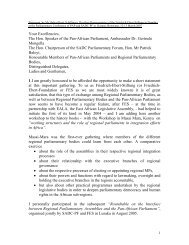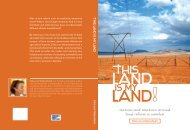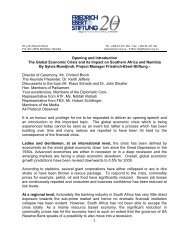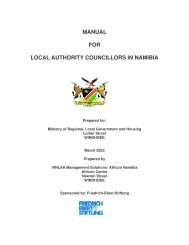Report - Friedrich Ebert Stiftung - Namibia
Report - Friedrich Ebert Stiftung - Namibia
Report - Friedrich Ebert Stiftung - Namibia
You also want an ePaper? Increase the reach of your titles
YUMPU automatically turns print PDFs into web optimized ePapers that Google loves.
Workshop <strong>Report</strong> on Police Labour Relations in <strong>Namibia</strong>: Time for a New Beginning?<br />
Police by reminding the participants that the <strong>Namibia</strong>n Labour Act does not apply<br />
to the Police force and pointing out that Police Regulation 5.2 (a, b) makes it an<br />
offence for a member without the written permission of the Inspector-General to<br />
form or join a trade union etc and further Regulation (a, c) provides that an officer<br />
shall be guilty of a misconduct if he/she attempts to secure intervention from<br />
political or outside resources in relation to his or her own or another member’s<br />
position or conditions of employment or functions in the force.<br />
Although Regulation 6(a) allows officers to be represented by a legal practitioner<br />
at disciplinary hearings no financial assistance with the legal cost is provided for<br />
and they have to bare the cost on their already meager salary.Their conditions of<br />
service and wages are recommended by the Public Service Commission upon<br />
submissions made by the Inspector-General to the Prime Minister for approval.<br />
As the Inspector-General hardly ever engages the members of the force to<br />
determine what they want before making the submissions he felt that the<br />
Inspector-General can never represent the interests of the officers adequately as<br />
he is effectively their employer. Therefore, collective bargaining in the Police is<br />
needed in respect of disciplinary hearings, promotions, transfers, duty rostering,<br />
grievance handling, job security, housing allocations, legal drafting, and issues<br />
related to the course and scope of duty. He set out the benefits that could come<br />
from proper intervention of trade unions.<br />
In respect of the Prison Services overview he pointed out that the Labour Act of<br />
1992 allowed members of the Prison and Correctional Services to form or belong<br />
to trade unions of their choice and consequently members joined either PSUN or<br />
NAPWU. The unions represent their members in disciplinary hearings and<br />
grievance handling especially relating to transfers, promotions, salaries and<br />
wages disputes, duty rostering, overtime work and pay and other conditions of<br />
service.<br />
Page 13



